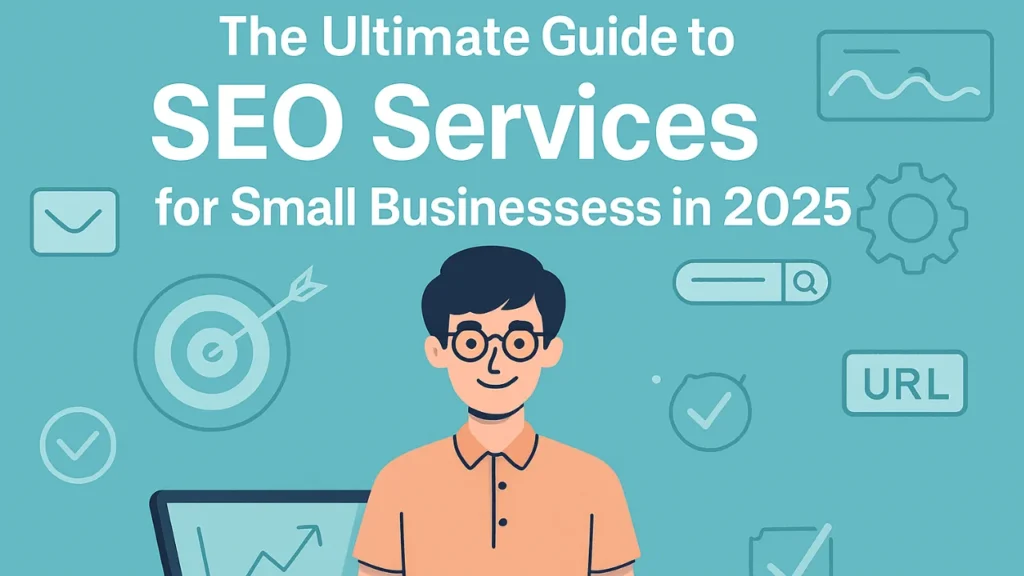Table of Contents
ToggleIf you’re running a small business and feel like your website is lost in the crowd, you’re not alone. It’s frustrating to put your heart into your work, only to watch your competitors show up on Google while your site barely gets noticed. You know your business has value. You know your products or services can truly help people. But online? Nobody seems to even be aware of your existence.
That’s a tough place to be. And sadly, it’s a struggle many small business owners face.
But here’s the truth: you don’t need to be a tech genius or spend thousands to turn things around. With the right SEO strategy, even the smallest business can rank, get found, and grow organically.
That’s exactly what this Ultimate Guide to SEO Services for Small Businesses is about. It’s designed to give you a clear, beginner-friendly roadmap to SEO in 2025. No jargon. No fluff. Just real, honest advice that actually works.
If you’ve been feeling invisible online, this is your chance to change that.
It’s time to show up where it matters—right in front of the people who are already searching for what you offer.
Let’s get started—and take your business from overlooked to unforgettable.
What Makes SEO So Important for Small Businesses in 2025?
SEO, or Search Engine Optimization, is how you help people find your small business online, without paying for ads. It’s what exposes you to clients who are already looking for what you have to offer. Whether they’re looking for a bakery in Lahore or an electrician in Karachi, they start with one thing: Google.
And if your business doesn’t show up? You’re not just missing traffic, you’re missing real people who want what you sell.
That’s why SEO matters so much in 2025. It’s your bridge to visibility, trust, and long-term growth—especially in a world where everything begins with a search.
We live in a time where people trust Google like they trust a friend. They use it to find answers, compare options, and make decisions. In actuality, you are invisible if you do not appear in search results. That can be frustrating, especially when you’ve worked hard to build something meaningful.
But here’s the good news: SEO gives every small business a fair shot to be seen. You don’t need a big marketing budget or a full-time tech team. All you need is some consistency and a clever plan.
Google decides who shows up on Page 1 using many factors, including:
- How helpful, relevant, and original your content is
- Whether your website works well on mobile phones and loads fast
- How simple it is for users to navigate your website
- And most importantly, whether your business looks credible and trustworthy
That’s why Google now looks for something called E-E-A-T:
Experience, Expertise, Authoritativeness, and Trustworthiness. These are the signals that show Google you’re not just another website, you’re someone real, with knowledge, heart, and integrity behind your business.
So no, SEO isn’t about “tricking” search engines with keywords. It’s about serving your customers better, answering their questions, solving their problems, and showing them why they should choose you.
And the best part? SEO keeps working even when you’re not. It’s an investment that keeps bringing in leads and building trust, day after day.
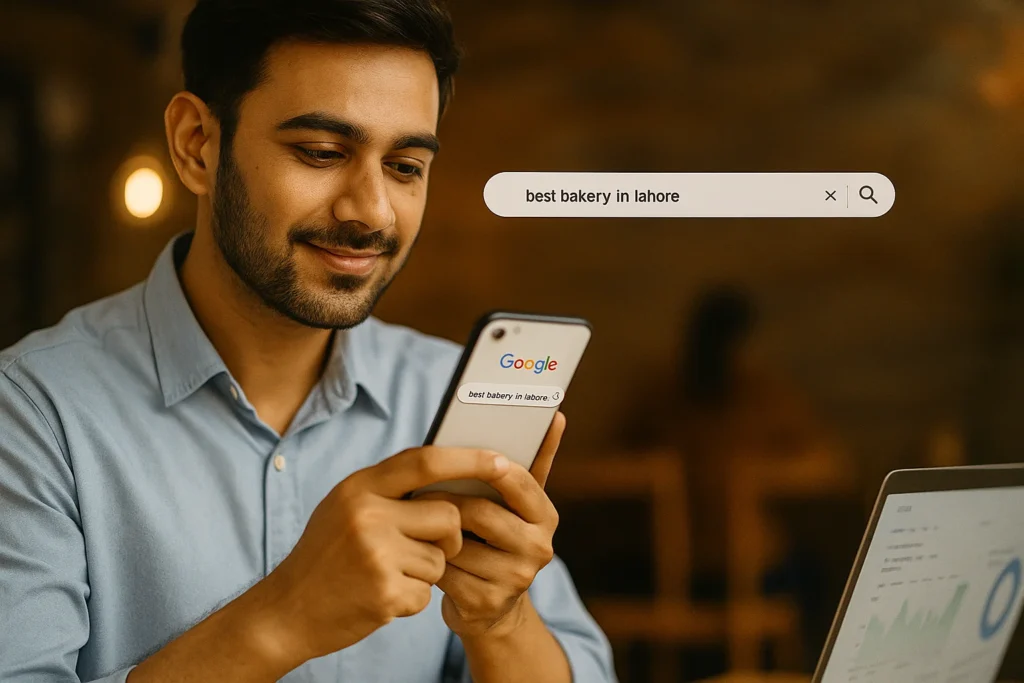
If you’re unsure whether your business is ready for SEO, check out our guide: 10 Signs Your Small Business Needs Professional SEO Services.
The Real Benefits of SEO for Small Businesses
Imagine this: you wake up, check your inbox, and see new customer inquiries. No ad spend. No cold calls. Just real people finding your business online while you sleep. That’s the quiet power of good SEO.
At GlobalRankWeb, we help small businesses achieve exactly that through our SEO services for small businesses—tailored for growth, not gimmicks.
SEO is a lifeline for small businesses, not merely a marketing strategy. Here’s what it can truly do for you:
- Build trust with local customers
When someone finds your business on Google Maps or in the top organic results, it instantly feels more credible. People trust what they see on the first page. And when your business shows up there, it sends a message: You’re reliable, nearby, and ready to help. - Bring in leads 24/7
Your website never sleeps. With strong SEO, your business keeps working—even after your doors close. It attracts people around the clock, giving you a steady stream of potential customers without lifting a finger. - Level the playing field with big brands
You don’t need a massive budget to compete online. SEO allows small businesses to show up right beside big companies. Your value can be clearly shown with the correct approach. - Put your business where people are already searching
Every day, your customers search for answers on Google. SEO helps you meet them exactly where they are—at the moment they need you most.
When done well, SEO becomes more than just traffic. It becomes your digital reputation, your strongest salesperson, and a long-term investment in your business growth.
And the best part? It’s not about chasing clicks—it’s about building real connections with the people who matter most.
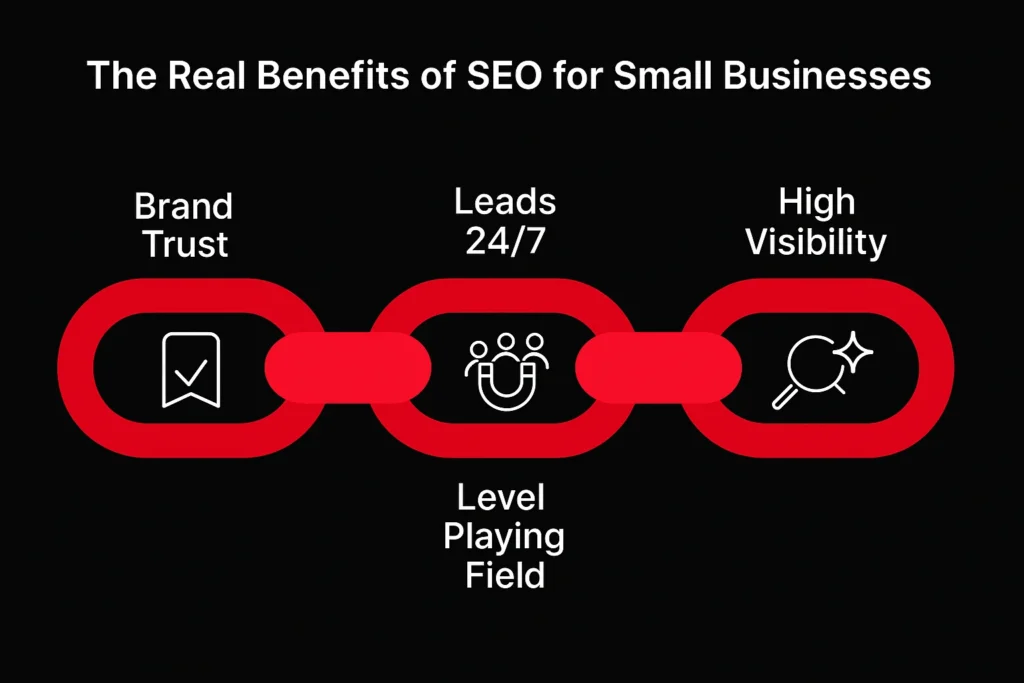
Different Types of SEO Explained (With Real-Life Examples)
When it comes to getting your business found online, not all SEO is the same. There are different strategies that work together like puzzle pieces to help your website rise in search results. Let’s break it down in a simple, friendly way—no tech talk, just real talk.
On-Page SEO: The Parts of Your Website You Can Control
Imagine your website as your digital storefront. If it’s clean, welcoming, and well-organized, people feel comfortable staying and are more likely to trust and contact you. That’s exactly what on-page SEO does. It helps both search engines and real people understand who you are, what you offer, and why you matter.
Here’s how to make your site truly shine:
- Title Tags & Meta Descriptions: These are your first impression on Google. They appear in search results and should be clear, engaging, and straight to the point, telling people exactly what your business offers and why they should click.
- Natural Keyword Use: Talk to your customers in their language. Use the words they’d search for, like “bridal makeup in Karachi” or “emergency plumbing services in Lahore”—but keep it natural. Focus on connection, not repetition.
- Helpful, Human Content: Think like your customer. What would they ask before booking or buying? Answer those questions clearly through your service pages, blog posts, and FAQs. Valuable content builds trust.
- SEO Plugins (for WordPress Users): Tools like Yoast SEO or RankMath act like friendly assistants. They guide you to write better content, fix basic SEO issues, and keep your site search-friendly even if you’re not tech-savvy.
- Structured data, often known as schema markup, is background coding that improves Google’s comprehension of your content. It can also give your site some extra shine in search results, like showing star ratings, FAQ dropdowns, or product info.
Example: If you run a salon in Karachi, a well-optimized homepage might say something like: “We offer affordable bridal makeup in Karachi for brides who want to look stunning on their big day.” It’s natural, helpful, and gets you in front of the right people.
On-page SEO isn’t about tricks, it’s about creating real value for your visitors. When your content is helpful, your message is clear, and your website feels easy to use, search engines and potential customers will reward you for it.
Want a detailed checklist? Check out our full On-Page SEO Checklist for Small Business Owners in 2025.
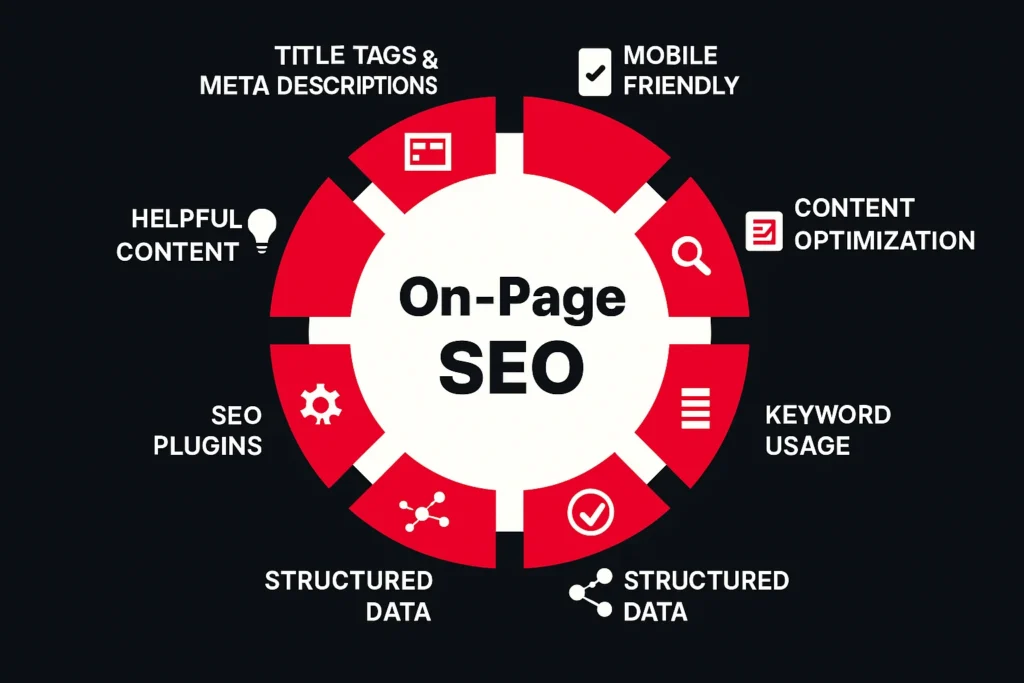
2. Off-Page SEO: Your Online Reputation
Off-page SEO is comparable to the online reputation of your company. It’s not what you say about yourself—it’s what others are saying about you across the internet. And in 2025, this kind of trust matters more than ever.
When people talk positively about your business online, Google takes notice. It sees those mentions, links, and reviews as “votes of confidence” that help boost your visibility in search results.
Here’s what really counts:
- Backlinks from trusted websites: When a respected blog, news site, or directory links to your website, it’s like getting a public recommendation. It informs Google that your company is reliable and deserving of a ranking.
- Social media shares and buzz: Every time someone shares your post or tags your business, it expands your reach. Staying in front of the correct people is more important than merely getting “likes.”
- Google reviews and customer feedback: Real reviews from real people build trust. A steady stream of positive reviews not only influences potential customers but also improves your local rankings on Google Maps.
- Mentions on local platforms: Getting featured in community blogs, Facebook groups, or local directories helps Google understand that you’re active and respected in your area.
Want to see how this works in real life?
Picture this: A home cleaning service in Islamabad delivers excellent service. One of their happy clients leaves a glowing review on Google and gives them a shoutout on a local parenting blog. That single backlink and review could lead to more online visibility, more clicks, and more bookings, without spending a single rupee on ads.
The takeaway?
The goal of off-page SEO is to establish credibility outside of your own website. In 2025, Google rewards small businesses that people talk about, share, and recommend. Focus on delivering great service, ask happy clients to leave reviews, and don’t be shy about building connections in your local community.
Because when others trust you, Google will too.
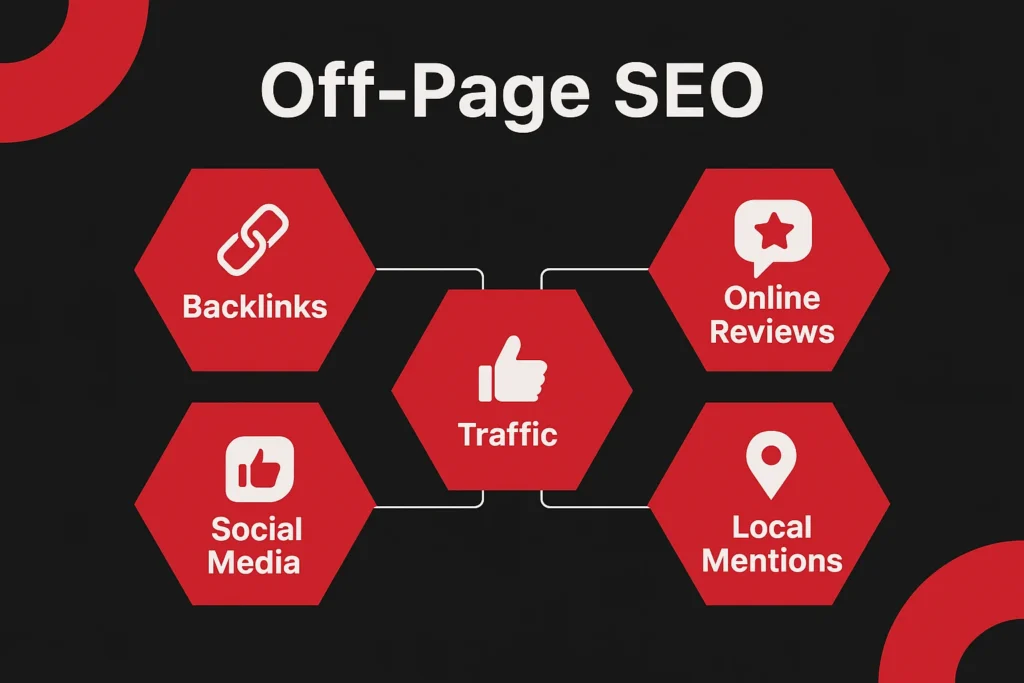
3. Technical SEO: Behind-the-Scenes Performance
Technical SEO can be thought of as your website’s engine. It’s not flashy or visible, but it’s what keeps everything running fast, smooth, and secure. And just like a well-maintained car performs better on the road, a technically sound website performs better in Google search.
People want websites to be seamless to use, load quickly, and function flawlessly on mobile devices by 2025. If your site is slow, confusing, or unsecured, visitors won’t stick around—and Google notices that.
Here’s what really matters in technical SEO:
- Mobile optimization: The majority of your site’s visitors are using mobile devices If your site doesn’t adjust well to smaller screens or is hard to navigate on mobile, you’re losing business before it even starts.
- HTTPS (SSL certificate): Security is a big deal. The “lock” image in the browser, which indicates that your website is secure, is an SSL certificate. Additionally, it makes Google more likely to trust you and give you a higher ranking.
- Fast loading speed: Every second counts. Users will leave your site if it takes too long to load. Speed affects not just user experience but also your rankings. You can see how well your website works using tools like GTmetrix or Google PageSpeed Insights.
- Clean site structure: Think of your website like a neat and tidy store. Clear menus, working links, and an easy path from one page to another help both people and search engines find what they need.
- Core Web Vitals: These are Google’s way of measuring how your site feels when someone uses it. Are buttons easy to click? Do pages load without shifting around? Is everything stable and smooth? These details shape how users (and Google) judge your site.
The truth is that you may enhance your technical SEO without being a developer or computer expert. Many small changes, like compressing images, fixing broken links, or updating your theme, can make a big difference.
Bottom line?
Technical SEO may be behind the scenes, but it plays a front-row role in your success. It’s about making sure your website isn’t just online, but working its best, for both people and search engines.
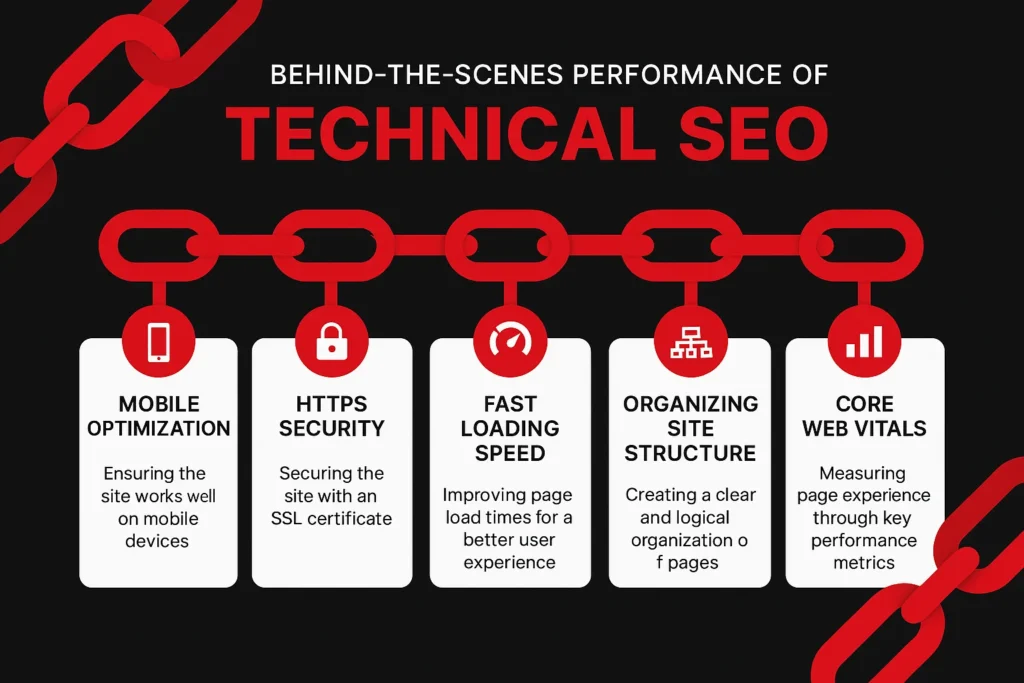
4. Local SEO: Show Up in Your Neighborhood
Imagine someone nearby searching for the exact service you offer—but they find your competitor instead, just because you didn’t show up online. That’s where Local SEO comes in. It helps your business appear in front of real people, in your local area, at the exact moment they need you.
Whether you run a bakery in Lahore, a tutoring center in Peshawar, or a car repair shop in Karachi, local SEO makes sure your neighbors can actually find you on Google, Maps, and other platforms.
Here’s how to make it work:
- Claim and optimize your Google Business Profile: This is your digital storefront. Add accurate info like hours, address, photos, and a short description of what you offer. Keep it updated—it shows you’re active and trustworthy.
- List your business in local directories: Add your name to platforms like Pakbiz, OLX, and local Facebook groups. These listings create more ways for people (and Google) to find you.
- Use location keywords naturally: Mention your city or neighborhood in your website text. It helps search engines understand where you serve and match you with local searches.
- Encourage positive reviews: Ask happy customers to leave a quick Google review. A few kind words from real people can build major trust and boost your ranking. If you want more detailed and practical local SEO tips, check out our guide: 15 Local SEO Tips for Small Businesses.
As an example, suppose you are the manager of a gym in Faisalabad. If you claim your Google Business Profile, post some real photos, and collect honest reviews from members, you could start ranking for searches like “best fitness center near me” even without running a single ad.
Why it matters:
In 2025, more people are using voice search like “dentist near me” or “best pizza in my area.” If your business isn’t optimized locally, you’re invisible. But with the right steps, you can become the top choice in your neighborhood.
Local SEO isn’t just marketing, it’s community visibility.
It connects you with real people nearby who are ready to buy, book, or visit. And in today’s digital world, showing up locally is how small businesses stay strong.
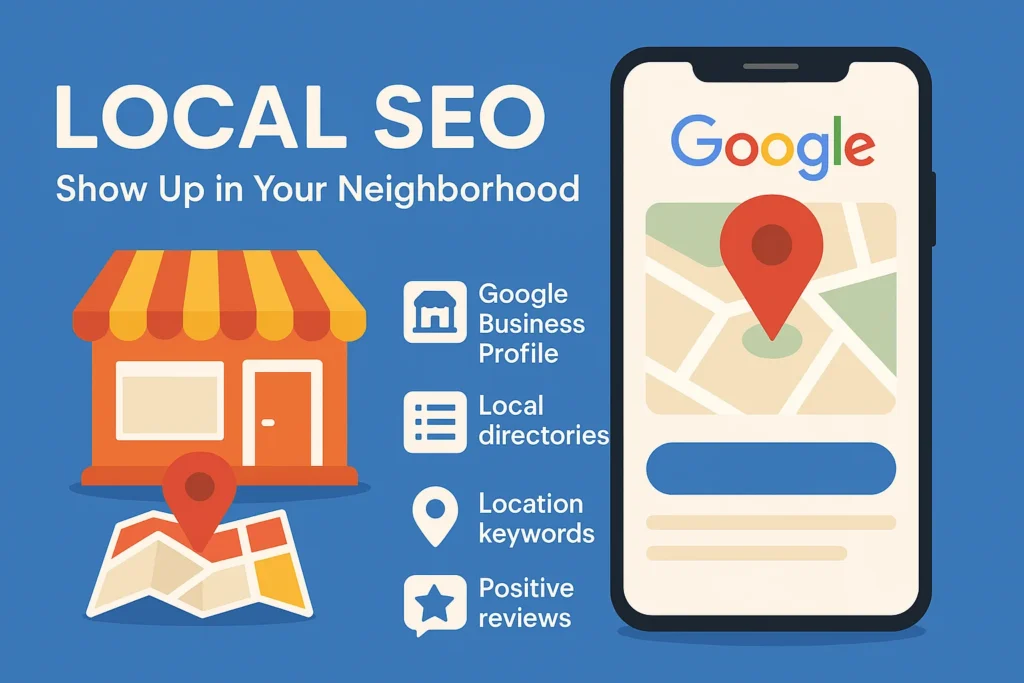
5. White Hat vs. Black Hat SEO: The Right Way to Succeed
When you’re trying to grow your business online, you might hear people throw around terms like “White Hat” and “Black Hat” SEO. It can sound confusing, but it’s really just about one big choice:
Do you want quick tricks, or do you want real results that last?
Let’s break it down simply:
White Hat SEO – The Honest, Long-Term Approach
This is the right way to do SEO. It’s about playing fair, creating value, and building trust with your audience and with Google.
You focus on:
- Writing helpful content that actually answers people’s questions
- Using keywords naturally, the way real people speak
- Making your website fast, secure, and mobile-friendly
- Earning backlinks by being useful, not by cheating
The result?
Steady, sustainable growth. No fear of getting penalized. Most significantly, you gain the genuine trust of your visitors.
Black Hat SEO – The Risky Shortcut
This is the wrong path. In an attempt to “deceive” search engines, it employs dubious tactics, including
- Keyword stuffing
- Buying fake backlinks
- Hiding spammy text on your site
- Copying content from others
Yes, it might work—for a little while.
But when Google catches you (and it always does), your site could drop in rankings or get banned altogether. And even worse, it damages your reputation with real customers.
The Truth You Need to Hear
Search engines are smarter than ever now. You can’t “cheat” your way to the top anymore—not for long.
White Hat SEO may take more time and patience, but it’s worth it.
Because what you’re really building isn’t just traffic or clicks.
You’re building trust, authority, and a reputation that lasts.
So whether you’re a local bakery, a freelance photographer, a plumber, or a home tutor, play the long game. Give your visitors real value, and Google will reward you for it.
Remember:
Good SEO isn’t about chasing algorithms. Helping others locate you when they need you most is the goal.
That’s how small businesses grow with honesty, heart, and hard work.
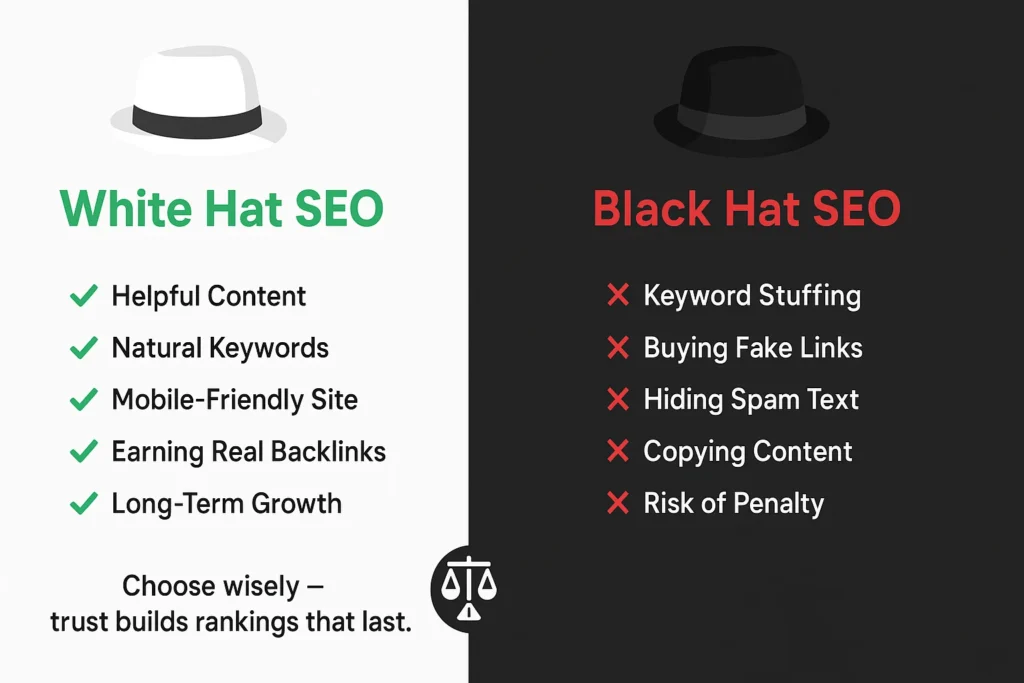
How SEO Works for Small Business Websites (Step-by-Step)
Have you ever questioned how Google chooses which websites to display first? It’s not magic—it’s SEO working quietly behind the scenes to bring your website in front of the right people.
Here’s how it actually works:
1. Search engines “crawl” your site:
Google uses tiny bots (like digital spiders) that scan your website, page by page. They look at your content, links, structure, and even images to understand what your site is about.
2. Your content gets indexed:
Your pages are added to Google’s enormous database after they have been crawled. Think of it like putting your business in a massive online library where people can find you through a search.
3. Google ranks pages by relevance and trust:
When someone searches for something you offer, Google quickly scans its database and shows the most relevant, helpful, and trustworthy results. If your website is well-optimized, you’re more likely to show up.
4. Your ranking depends on several factors:
Things like high-quality content, your site’s speed and structure, mobile-friendliness, backlinks from trusted websites, and even how easy your site is to use all play a role.
Pro Tip: Use free tools like Google Search Console to see how your pages are performing, and PageSpeed Insights to fix any loading issues. A faster, healthier site = better rankings.
Why it matters:
Good SEO isn’t just for big brands; it’s a way for small businesses to stand out, get discovered, and grow without spending huge amounts on ads. When your website is optimized, it works 24/7—bringing in visitors, leads, and opportunities even while you sleep.
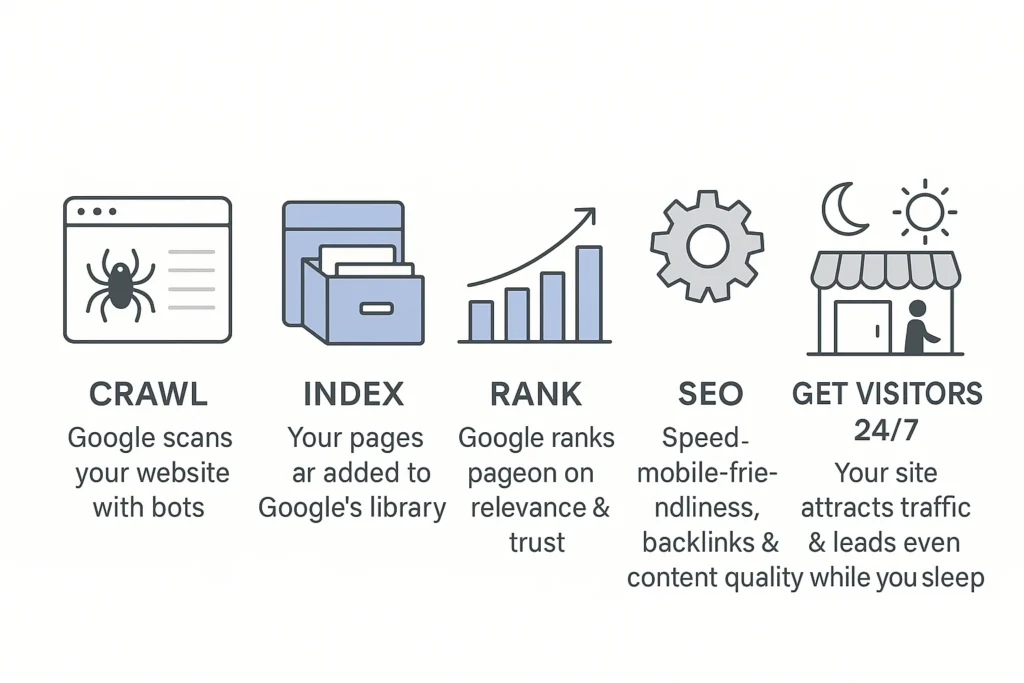
SEO vs. Paid Ads for Small Businesses: Which One Actually Works?
Both SEO and paid ads can help your business grow, but they work in very different ways.
Let’s take a real-life story.
Ali owns a small bakery in Lahore. At first, he ran Facebook and Google ads. He got some clicks, but not many real orders. The moment he stopped paying, the traffic disappeared. It was similar to pouring cash into a bucket that had holes in it.
Then Ali tried something different: he focused on local SEO.
He updated his Google Business Profile with photos and accurate info, added simple keywords like “custom cakes in Lahore” to his website, and politely asked his happy customers to leave honest reviews.
Two months later, his bakery started showing up on the first page of Google when people searched for birthday cakes, wedding cakes, and more. And this time, the traffic didn’t disappear—it kept growing, without paying again and again.
What’s the difference?
- SEO brings in free, consistent traffic over time. It builds trust and keeps working, even when you’re not spending money daily.
- Paid ads can bring quick results, but the moment you pause your campaign, the traffic stops too.
Smart Tip: For small businesses with a limited budget, investing in SEO is like planting seeds. It takes time, but the rewards keep coming. Paid ads can be useful for promotions or quick visibility, but they shouldn’t replace a solid SEO foundation.
Want a deeper comparison? Read our full guide: SEO vs. Paid Ads: Which Is Better for Small Businesses?
How to Pick Your Small Business’s Best SEO Agency
Choosing an SEO agency can feel overwhelming, especially when you’re a small business owner trying to make the most of every rupee. You want results, not empty promises. The truth is, the right agency can help your business grow steadily and sustainably. The wrong one can waste your time, money, and trust.
Here’s how to spot the difference:
Green Flags: What to Look For
- Verified outcomes: Request case studies or examples. A good agency won’t hesitate to show how they’ve helped other small businesses succeed.
- Clear, honest communication: They should explain things in simple language, not just throw jargon at you.
- Focus on long-term ROI: It’s not just about traffic—it’s about getting more calls, bookings, and customers.
Red Flags: What to Avoid
- “Guaranteed #1 rankings”: No one can promise this. If they do, walk away.
- Vague pricing: If they can’t explain what you’re paying for, that’s a problem.
- No progress reports: You deserve to know what’s being done and what results you’re getting.
Ask These Questions Before You Hire:
- What’s included in your SEO audit? (This tells you how deeply they analyze your site.)
- Which SEO tools do you use? (Are they using trusted industry tools like Ahrefs, SEMrush, or Google Search Console?)
- How will you optimize my website? (You want clear, actionable steps, not generic promises.)
Pro Tip: Choose an agency that understands small businesses. They should treat your website like it’s their own because to you, it’s not just a site. It’s your storefront, your brand, your future.
DIY SEO vs Hiring an Expert: What’s Right for You?
When it comes to growing your small business online, one big question often comes up: Should I do SEO myself or hire a professional?
Let’s break it down simply and honestly.
Doing SEO Yourself (DIY)
If you’re just starting out or working with a tight budget, doing your own SEO can be a great first step. There are plenty of free and low-cost tools to help you learn and make progress.
Helpful DIY Tools:
- Google Analytics – See who’s visiting your site and what they’re doing.
- Google Search Console – Monitor your search performance and find technical issues.
- SEMrush (or Ubersuggest) – Discover what keywords people search and what your competitors are ranking for.
- Rank Math (for WordPress users) – Easily optimize your content for search engines without needing to code.
When DIY Makes Sense:
- You enjoy learning new things
- You have the time to test, tweak, and improve
- You want full control over your strategy
But be honest with yourself. SEO is a long game. It takes time, consistency, and patience. If you’re already juggling a million things, it might not be the best use of your energy.
Hiring an Expert
Hiring an SEO expert or agency takes the pressure off your shoulders. You get someone who understands the latest algorithms, tools, and strategies—and they can help you see results faster, without the trial and error.
When Hiring Makes Sense:
- You’re too busy running your business
- You want faster, more professional results
- You’re feeling stuck or overwhelmed doing it yourself
Yes, hiring help costs money—but think of it as an investment in visibility, traffic, and future growth. When done right, the return can be far greater than the cost.
Final Thought:
There’s no one-size-fits-all answer. If you’re curious and committed, start with DIY. If you’re short on time or just want results, bring in someone who knows the ropes. Either way, the goal is the same: help people find your business when it matters most.
Best SEO Tools for Small Businesses in 2025
Running a small business is already a full-time job—you shouldn’t have to guess what’s working online. That’s where the right SEO tools become your silent business partners. They don’t just save time, they give you clarity, fix issues fast, and help you understand what’s truly helping your business grow.
Whether you’re doing SEO yourself or working with a pro, these tools can make a real difference:
- Google Search Console: It gives you a direct connection to how Google sees your website. It shows how your pages are performing in search, alerts you about issues, and helps you improve your visibility step-by-step.
- Google Analytics: Learn who’s visiting your site, how they found you, and what they’re doing once they arrive. It’s like having a behind-the-scenes look at your audience’s behavior.
- SEMrush: A powerful all-in-one SEO platform for tracking keywords, auditing your site, and spying (ethically!) on your competitors. It helps you spot gaps and uncover growth opportunities.
- Ahrefs: Perfect for researching competitors, tracking backlinks, and identifying keyword gaps. It shows you who’s linking to you—and who isn’t (yet).
- Moz: Great for small and local businesses. It helps improve your local search presence, monitor keyword rankings, and track your website’s domain authority over time.
- Rank Math: A user-friendly SEO plugin for WordPress that helps you optimize your content right inside your dashboard. From meta descriptions to schema markup, it guides you with easy-to-follow suggestions that actually work.
Why these tools matter:
Growing online doesn’t require a large expenditure; all you need are the appropriate resources. With them, you’ll make smarter decisions, improve faster, and compete confidently with bigger brands. It’s like turning on a light in a dark room: once you can see clearly, you know exactly where to go.
Typical SEO Errors Made by Small Businesses (and How to Correct Them)
Even the most hardworking business owners sometimes miss the mark when it comes to SEO. And that’s okay because once you know what’s wrong, you can fix it. For a deeper dive, check out our guide on common SEO mistakes small business websites make (and how to fix them). Here are some of the most common SEO slip-ups that could be holding your website back and how to turn them around:
1. Keyword Stuffing
Trying to force too many keywords into your content makes it sound robotic, and Google notices.
Fix it: Write naturally, like you’re having a conversation with your customer. Focus on answering real questions and solving real problems, and keywords will fall into place without overthinking.
2. Ignoring Mobile SEO
Mobile devices account for almost half of all searches. If your site isn’t mobile-friendly, users will bounce, and Google will push you down in the rankings.
Fix it: Make sure your website loads fast, looks clean, and works smoothly on phones and tablets. A mobile-friendly site = a better experience = better rankings.
3. No Clear SEO Strategy
Posting random blogs or updating pages without a plan won’t get you very far.
Fix it: Start with a simple SEO roadmap. Know your target audience, research the keywords they use, and build content around what they actually care about. Focus on quality over quantity.
For a complete step-by-step approach, read our detailed guide on Effective SEO Content Strategy for Small Businesses to learn how to plan, create, and scale content that actually ranks.
Before creating an SEO strategy, it’s important to choose the right keywords. Check out our guide: How to Do Keyword Research for a Small Business Website.
4. Neglecting Your Google Business Profile
Outdated contact info, missing hours, or old photos can seriously hurt your credibility, especially for local businesses.
Fix it: Keep your Google Business Profile up to date. Add recent photos, respond to reviews, and make sure all details (like phone numbers and opening hours) are accurate. It builds trust and helps you show up in local searches.
Bottom line:
SEO mistakes are common, but they’re not permanent. Every small fix you make brings you one step closer to higher rankings, more visibility, and real growth. You don’t have to be perfect—you just have to be consistent.
Local SEO Checklist for Business Owners
Do you want to be there when locals look for your service? Local SEO is your best friend. It helps your business appear in Google searches, Maps, and “near me” results right when your neighbors are looking for what you offer. Here’s a powerful, easy-to-follow checklist that every local business owner should use:
Claim and Fully Optimize Your Google Business Profile
This is your digital storefront. Make sure every detail is correct—your name, hours, phone number, website, photos, and a clear description of what you do. A detailed profile helps you appear in local results and fosters confidence.
Add Your City or Area to Website Content
Whether you serve Lahore, Islamabad, or a small neighborhood in Peshawar, let your website say it clearly. Sprinkle your location naturally in your homepage, service pages, and blog posts so search engines (and customers) know where you work.
Ask Happy Customers for Reviews
Positive reviews are gold. They boost your credibility, help you rank higher, and encourage others to choose you. Don’t be shy, just ask! Most happy clients are glad to leave a kind word if you make it easy for them.
Keep Your NAP (Name, Address, Phone) Consistent Everywhere
Inconsistent business details across the web confuse both search engines and customers. Make sure your business name, address, and phone number are exactly the same on your website, Google profile, directories, and social media pages.
Why it matters:
Local SEO isn’t just about ranking—it’s about showing up for the people who live near you, trust you, and are ready to buy. And the best part? These simple steps can create a big impact without spending a single rupee on ads.
How Much Does SEO Cost for Small Businesses in 2025?
Let’s be honest, small businesses often work with tight budgets. But when it comes to SEO, you’re not just spending money, you’re investing in long-term visibility, credibility, and growth. Here’s a breakdown to help you plan wisely:
DIY SEO – Budget-Friendly, But Time-Heavy
If you’re doing it yourself using free tools like Google Analytics or Rank Math, you’ll save money, but it takes serious time to learn and implement everything correctly. This is a good option if you love learning and have the hours to commit.
Freelancers – Affordable Support
Hiring a freelancer usually costs between $150–$500/month, depending on their experience and services offered. It’s a great middle ground if you want guidance but don’t need a full agency yet.
SEO Agencies – Full-Service, More Results
Agencies typically charge $500–$2000+ per month, depending on your goals, competition, and scope of work. The good ones offer tailored strategies, regular reports, and real results. Some even offer value-based pricing, where you only pay for what they deliver.
Real Talk:
It might feel like a lot upfront, but SEO is one of the few marketing strategies that keeps paying off even after the work is done. A well-optimized site can keep attracting leads long after your last payment.
How to Measure SEO Success (Simple KPIs & Tools)
Once you’ve started doing SEO, how do you know it’s actually working? Numbers don’t lie—but they need to be the right ones. Here’s how to track what matters:
Key Things to Measure:
- Website Traffic: Are more people visiting your site each month?
- Keyword Rankings: Are you moving up on Google for important search terms?
- Conversions: Are people filling out your forms, calling you, or making purchases?
Tools That Help:
- Google Analytics: Understand who’s visiting, how they found you, and what they do.
- Google Search Console: See which keywords you rank for, and find technical issues.
- Ahrefs and SEMrush: More in-depth information on competitors, backlinks, and rankings.
Terms You’ll Often Hear:
- Click-through rate, or CTR, is the frequency with which users click on your listing after viewing it.
- The number of visitors who depart without interacting is known as the bounce rate.
- Goal Conversions: Actions that matter, like form submissions, bookings, or sales.
Why this matters:
You can’t improve what you don’t measure. These numbers show you what’s working, where you’re losing traffic, and what needs to be fixed. Think of them as your SEO health check—they guide your decisions and help you grow smarter, not just harder.
The Future of SEO for Small Businesses
The world of SEO keeps evolving, and if you’re a small business owner in 2025, staying ahead isn’t optional anymore; it’s essential. The way people search is changing fast, and if your business wants to stay visible, you need to grow with it.
- Voice Search Is Growing Fast
More and more people are using voice assistants like Siri, Alexa, and Google to find local businesses. That means your content needs to sound natural, like how people talk, not just how they type. - AI Tools Are Leveling the Playing Field
A large budget is no longer necessary to compete. Smart AI-powered SEO tools now help small businesses research keywords, write content, and track performance in minutes, not days. - Mobile-First Is No Longer Optional
Google now looks at your mobile site first—so if your website isn’t fast, responsive, and easy to use on a phone, you’ll lose out on rankings (and customers).
Why It All Matters
In today’s crowded digital world, being invisible online means being forgotten. But with the right SEO strategy, your business can rise above the noise so your customers can find you, trust you, and choose you.
Bonus: Your Local SEO Quick Cheat Sheet
Local SEO is a game-changer for small businesses, but many owners feel stuck not knowing where to start or which steps actually matter. That’s exactly why we created a simple, practical guide that gives you a clear step-by-step roadmap.
Don’t miss this: Ultimate Local SEO Cheat Sheet for Small Businesses
Inside this cheat sheet, you’ll find:
An easy-to-follow checklist you can apply right away
Quick tips to optimize your Google Business Profile
A simple formula for using local keywords and reviews the right way
Smart shortcuts to boost your local rankings without spending on ads
If you want your business to show up at the top of those “near me” searches, this cheat sheet is made for you.
Final Thoughts: You Don’t Have to Be a Tech Expert to Win with SEO
Let’s be real—SEO might sound complicated, but at its heart, it’s just about helping people find your business when they need it most. You don’t have to be an expert in technology or comprehend algorithms. What you do need is patience, consistency, and a deep understanding of your customers.
Start small. Maybe it’s updating your Google Business Profile, improving a few pages on your site, or writing one helpful blog post each week. Over time, these small efforts build real momentum.
Think of SEO as planting seeds. You water them with good content, care for them by fixing issues, and in return, they grow into visibility, traffic, and trust.
Remember this:
“Your customers are out there searching. Be the business they find—and trust—when they do.”
Ready to Finally Get Noticed Online?
SEO is the way to go if your company deserves more clients, clicks, and trust. No more speculating, no more squandered advertising dollars, no more hiding.
At GlobalRankWeb, we specialize in helping small businesses rise above the noise. We don’t offer shortcuts—we deliver real, lasting growth that keeps working for you day after day.
Whether you’re struggling to rank, not getting enough traffic, or just tired of watching competitors outrank you, we’re here to change that.
Let’s build something powerful together.
Your business is ready. Are you?
👉 Talk to us today — Your next customer is already searching. Make sure they find you.

